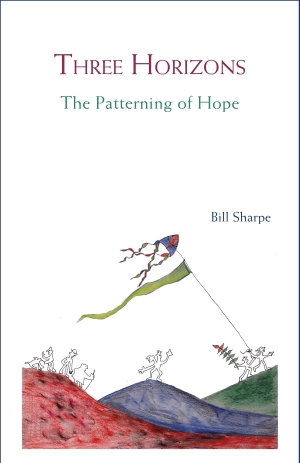Read More |
Three Horizons: A Brief IntroductionHow can people with widely varying backgrounds, expertise, and worldviews come to a shared vision of the future? How can we work constructively with the problems our society faces that defy analysis and demand that we learn
our way together into the future respecting both our knowledge and our ignorance of what to do? Over the last few years the Three Horizons framework has emerged as a way of helping people with these challenges. Three Horizons is a way of working with transformational change, drawing attention towards systemic patterns rather than individual events or unexamined trends; it frames the discussion in terms of the shift from the established patterns of the first horizon to the emergence of new patterns in the third, via the transition activity of the second. A simple linear way of thinking about change places us in the present moment looking towards how we want things to be in future – placing the future outside the present moment, something that might or might not happen, and appearing in the guise of the unknown or unknowable and the risky. Yet we act with future intent all the time, linking what we are doing now to future outcomes. The central idea of Three Horizons, and what makes it so useful, is that it draws attention to the three horizons as existing always in the present moment, and that we have evidence about the future in how people (including ourselves) are behaving now. By making these qualitative distinctions between the three horizons in the present, a lot of dynamics of change come into view quite naturally, and we are led to explore them in terms of the patterns of behaviour of those who are maintaining or creating them. This leads to the additional benefit, that we can reflect on our own intentions towards those patterns in the process of exploring the behaviour and intent that is revealed in each horizon. Three Horizons thinking offers a way to find and shape our own intentions more clearly as we look over the first horizon of the known towards the second and third horizons of innovation and transformation towards the future. It transforms our perception of the future potential of the present moment by revealing each horizon as a different quality already existing in the present, and which might develop depending on how we choose to act – to maintain the familiar or pioneer the new. The outcome of Three Horizons work is a map of transformational potential which enables us to act with more skill, freedom and creativity in the present, both individually and together. Read the rest of this Introduction to Three Horizons thinking (published in The Association of Professional Futurists' Compass Newsletter). |
The Case Studies
Read more:
Book Page
Systems Thinking and 3 Horizons The Author Reviews Related Titles: All Intl. Futures Forum titles |

